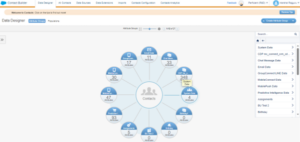In today’s era of data-driven marketing, the ability to understand and engage customers on a personal level is more important than ever. Salesforce Marketing Cloud (SFMC) offers a robust suite of tools to help marketers achieve this, and at the center of it all is Contact Builder—a powerful feature designed to manage and unify customer data for actionable insights and precise targeting.
This blog explores how Contact Builder works, its standout features, and why it’s an indispensable tool for modern marketers.
What is Contact Builder?
It serves as the cornerstone for managing customer data within Salesforce Marketing Cloud. It provides marketers with a centralized platform to create and manage contact profiles by connecting data from multiple channels, including email, SMS, website interactions, and offline data sources.
With Contact Builder, businesses can:
- Bring together scattered data to create a unified customer profile.
- Define relationships between data sets to gain deeper insights.
- Build highly personalized and targeted marketing campaigns based on customer behavior and attributes.

Core Features
-
Data Designer
At the heart of Contact Builder lies Data Designer, which allows marketers to map and structure customer data. By creating data extensions (customized data tables), you can link various datasets to the main contact record, ensuring an organized and relational structure.
-
Contact Configuration
Contact Builder ensures every record is tied to a unique identifier—such as an email address, phone number, or customer ID—helping to maintain accurate and non-duplicated data across systems.
-
Data Extensions
Data Extensions are the building blocks of your contact data in SFMC. These are custom tables that store information such as email addresses, purchase history, or preferences. Data Extensions allow you to:
- Segment audiences for personalized marketing.
- Store and manage large volumes of customer data efficiently.
- Customize data fields to match your marketing requirements.
-
Data Sources
Data Sources in Contact Builder make it possible to integrate customer data from various systems into SFMC. These can include CRM systems, external databases, web interactions, and more. By bringing in data from multiple sources, marketers can:
- Gain a unified view of the customer.
- Seamlessly link online and offline data.
- Ensure consistency across channels for more accurate insights.
-
Contact Analysis
Contact Builder’s Contact Analysis feature allows marketers to monitor and understand the state of their data. With insights into active, stale, or duplicate contacts, businesses can:
- Improve the quality of their data.
- Optimize audience targeting.
- Reduce the risk of compliance issues by identifying outdated or unused records.
Why Use Contact Builder?
-
A Complete View of the Customer
Contact Builder merges data from multiple sources into a single, comprehensive profile, offering marketers a 360-degree view of each customer’s preferences, activities, and touchpoints.
-
Enhanced Personalization
By understanding customer behavior and linking relevant data, marketers can craft personalized campaigns that resonate with their audience, leading to higher engagement and conversion rates.
-
Scalable Data Management
Whether you’re handling hundreds or millions of customer records, Contact Builder is designed to handle data efficiently and scale seamlessly with your business.
-
Streamlined Omnichannel Integration
Contact Builder connects seamlessly with other Marketing Cloud tools, such as Journey Builder and Email Studio, allowing for consistent messaging and experiences across all marketing channels.
-
Improved Compliance and Data Hygiene
With features like population management and secure contact deletion, Contact Builder ensures that your data remains organized, accurate, and compliant with legal requirements.
How Contact Builder Empowers Marketers
-
Segmentation for Better Targeting
By organizing and connecting data, Contact Builder enables marketers to create highly targeted campaigns. For example, you can build a segment of loyal customers who made recent purchases and send them tailored rewards or offers.
-
Consistent Messaging Across Channels
Contact Builder ensures that customer profiles remain consistent across different channels, enabling marketers to deliver seamless experiences through email, mobile apps, SMS, and more.
-
Informed Decision-Making
Unified customer data helps marketers analyze trends and behaviors, uncovering insights that drive data-driven decisions and campaign optimization.
Best Practices
- Plan Your Data Model Strategically: Define relationships and data structures in advance to keep your system flexible and scalable.
- Keep Data Clean: Regularly update and validate your data to eliminate duplicates or outdated records.
- Leverage Attribute Groups: Organize related data in groups for more meaningful segmentation and targeting.
- Test and Refine: Run tests to ensure your data model aligns with your campaign goals and make adjustments as necessary.
Conclusion
Salesforce Marketing Cloud’s Contact Builder is more than a data management tool—it’s a powerful enabler for customer-centric marketing. By providing a unified view of your audience, it allows businesses to craft personalized, impactful campaigns that drive results.
Whether you’re managing customer journeys or executing targeted email campaigns, it ensures that your data becomes the foundation for success. By using it effectively, you can unlock the full potential of your marketing efforts and build stronger, more meaningful relationships with your audience.
If you haven’t already started using Contact Builder, it’s time to explore its potential and see how it can transform your approach to data-driven marketing.
Also look at the below articles :


Extremely insightful 👏🏻
Thank you for your time going through the article, I really appreciate your views.